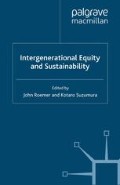Abstract
The need to aggregate and evaluate infinite streams of returns or utility arises in several areas of economics, ranging from intergenerational welfare theory to environmental economics. The subject of intergenerational equity in the context of aggregating infinite utility streams has been of enduring interest to economists, starting with the work of Ramsey (1928), who had maintained that discounting one generation’s utility or income vis-à-vis another’s to be ‘ethically indefensible’, and something that ‘arises merely from the weakness of the imagination.’ His conjecture about the difficulty of aggregating infinite streams, while respecting intergenerational equity, turned out to be compelling, as a large number of impossibility theorems were proved subsequently by a number of authors, starting with the seminal works of Koopmans (1960) and Diamond (1965).
This paper benefited greatly from a presentation and discussion at the IEA Roundtable Meeting in Hakone, Japan, 10–12 March 2005, and from a detailed comment by Yongsheng Xu. This is an area where, over the years, we have had conversations with and comments from a large number of economists and would like to thank, in particular, Geir Asheim, Claude d’Aspremont, Kuntal Banerjee, Marc Fleurbaey, Nick Kiefer, Wlodek Rabinowicz, Tomoichi Shinotsuka, Kotaro Suzumura and Jorgen Weibull.
Access this chapter
Tax calculation will be finalised at checkout
Purchases are for personal use only
Preview
Unable to display preview. Download preview PDF.
References
Armstrong, W.E. (1939) ‘The Determinateness of the Utility Function’, Economic Journal, vol. 49, pp. 453–67.
Arrow, K.J. (1963) Social Choice and Individual Values, 2nd edn ( New York: John Wiley).
Basu, K. (1994) ‘Group Rationality, Utilitarianism and Escher’s “Waterfall”’, Games and Economic Behavior, vol. 7, pp. 1–9.
Basu, K. and T. Mitra (2003) ‘Aggregating Infinite Utility Streams with Intergenerational Equity: The Impossibility of Being Paretian’, Econometrica, vol. 79, pp. 1557–63.
Bossert, W., Y. Sprumont and K. Suzumura (2004) ‘The Possibility of Ordering Infinite Utility Streams’, mimeo: Université de Montreal.
Cowen, T. and D. Parfit (1992) ‘Against the Social Discount Rate’, in P. Laslett and J.S. Fishkin (eds), Justice between Age-Groups and Generations ( New Haven: Yale University Press ).
Diamond, P. (1965) ‘The Evaluation of Infinite Utility Streams’, Econometrica, vol. 33, pp. 170–7.
Fleurbaey, M. and P. Michel (2003) ‘Intertemporal Equity and the Extension of the Ramsey Principle’, Journal of Mathematical Economics, vol. 39, pp. 777–802.
Koopmans, T.C. (1960) ‘Stationary Ordinal Utility and Impatience’, Econometrica,vol. 28, pp. 287–309.
Majumdar, T. (1962) The Measurement of Utility, 2nd edn ( London: Macmillan).
May, K.O. (1952) ‘A Set of Independent Necessary and Sufficient Conditions for Simple Majority Decision’, Econometrica, vol. 20, pp. 680–4.
Munkres, J. (1975) Topology ( London: Prentice Hall).
Ramsey, F.P. (1928) ‘A Mathematical Theory of Savings’, Economic Journal, vol. 38, pp. 543–59.
Segerberg, K. (1976) ‘A Neglected Family of Aggregation Problems in Ethics’, Nous, vol. 10, pp. 221–44.
Sen, A.K. (1970) Collective Choice and Social Welfare ( San Francisco: Holden-Day).
Sen, A.K. (1977) ‘On Weights and Measures: Informational Constraints in Social Welfare Analysis’, Econometrica, vol. 45, pp. 1539–72.
Suzumura, K. (1983) Rational Choice, Collective Decisions and Social Welfare ( Cambridge: Cambridge University Press).
Suzumura, K. and T. Shinotsuka (2003) ‘On the Possibility of Continuous, Paretian and Egalitarian Evaluation of Infinite Utility Streams’, mimeo: Institute of Economic Research, Hitotsubashi University.
Svensson, L.-G. (1980) ‘Equity among Generations’, Econometrica, vol. 48, pp. 1251–6.
Xu, Y. (2007) ‘Pareto Principle and Intergenerational Equity: Immediate Impatience, Universal Indifference and Impossibility’, Ch. 7 of this volume.
Editor information
Editors and Affiliations
Copyright information
© 2007 International Economic Association
About this chapter
Cite this chapter
Basu, K., Mitra, T. (2007). Possibility Theorems for Equitably Aggregating Infinite Utility Streams. In: Roemer, J., Suzumura, K. (eds) Intergenerational Equity and Sustainability. International Economic Association Series. Palgrave Macmillan, London. https://doi.org/10.1057/9780230236769_5
Download citation
DOI: https://doi.org/10.1057/9780230236769_5
Publisher Name: Palgrave Macmillan, London
Print ISBN: 978-1-349-28344-6
Online ISBN: 978-0-230-23676-9
eBook Packages: Palgrave Economics & Finance CollectionEconomics and Finance (R0)

